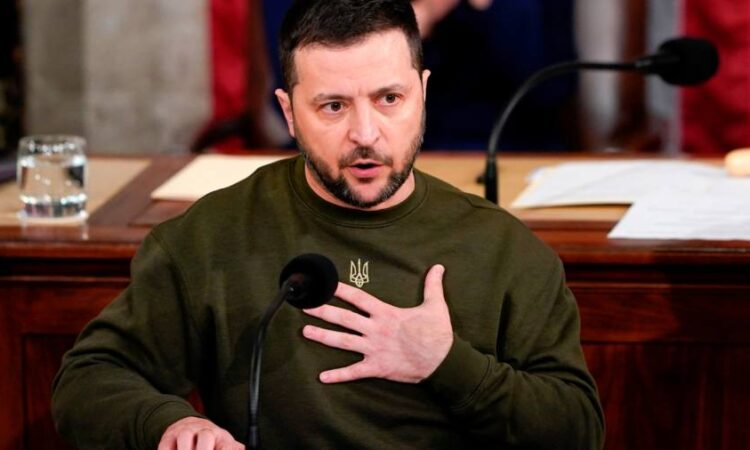
Welcome back. With Christmas upon us, two news stories — concerning the Ukraine war and the legacies of European colonialism — provide an opportunity to reflect on the lessons we can draw from the events of 2022. I’m at tony.barber@ft.com.
First, some housekeeping. There will be no Saturday edition of Europe Express next week. Normal service will resume on Saturday January 7.
Enduring power of the nation-state
Ukrainian president Volodymyr Zelenskyy’s lightning wartime visit to Washington this week drew comparisons with a famous trip made by British premier Winston Churchill in December 1941 to confer with President Franklin Roosevelt, only days after the Japanese attack on Pearl Harbor.
Here are my thoughts on what Russia’s aggression, Ukraine’s self-defence and the west’s support for Kyiv tell us about a world order shaken by the war.
First, the enduring power of the nation-state. It encapsulates the principles of freedom, self-government and identity for which Ukrainians are fighting.
Russia’s invasion was a calculated assault on Ukrainian statehood and national identity. But it is backfiring in the sense that the terrible sacrifices of war have welded the leadership and people of Ukraine to these ideas as never before.
Second, the attractiveness of the EU and Nato as multinational alliances of democracies. Ukraine and Moldova became formal candidates for EU membership in June. Earlier this month, after a long wait, so did Bosnia and Herzegovina.
Meanwhile, Finland and Sweden are on track to join Nato. Assuming Hungary and Turkey — the two remaining holdouts — ratify the Finnish and Swedish applications in 2023, that will bring Nato’s membership to 32 countries.
Third, the descent of Russia into dictatorship. The diagnosis of Russian-born historian Sergey Radchenko says it all: “Russia is being turned into a garrison state, where people live short, nasty, brutish lives, and where all reality ultimately resolves itself into misery, tyranny and war.”
Clouds over EU enlargement
Some words of caution. By no means everything is going the west’s way. Increasing tensions with China, especially over Taiwan and global trade, show every sign of getting worse in 2023. Inflation and recession loom over western economies.
Beyond the democracies of North America, Europe and their allies, much of the world is not aligned with the west in the Ukraine war or the unfolding contest with China.
Finally, the war in Ukraine has exposed differences over policy towards Russia between western European members of the EU, chiefly France and Germany, and central and eastern European states, led by Poland. This raises the question of whether the EU’s promises of membership for Balkan countries, Moldova and Ukraine will remain just that — promises.
France and Germany want to link EU expansion to political and economic reform of the 27-nation bloc. But many central and eastern Europeans — despite being strong supporters of EU enlargement — are in no way inclined to accept the leadership of Paris and Berlin, on account of their wariness over French and German attitudes towards Russia.
By the end of 2023, I would welcome the chance to say the EU has made real progress on enlargement. For now, I am not raising my hopes.
Legacies of European imperialism
In case you missed it, Dutch prime minister Mark Rutte gave a speech on Monday that was arguably the most clear-cut apology ever made by a European head of government for slavery in the era of imperialism.
You can find the speech here on the website of the Dutch government, which announced that it plans to set up a €200mn fund for measures aimed at raising awareness and addressing the present-day effects of slavery.

You could say, well, about time. But the fact remains that, belated though such steps are, they are gathering momentum.
Last year, Belgium’s king Philippe expressed regrets for the savagery of Belgian colonial rule in Congo, though it was a less explicit statement than that of Rutte. The German government did the same with regard to Namibia.
The larger European former colonial powers, notably France, Spain and the UK, approach such matters with more circumspection. Still, the Dutch statement showed the way — and, in the process, indirectly highlighted the fact that a war of attempted imperial conquest, or reconquest, is going on right now in Ukraine.
Reappraisals of Europe’s age of colonialism are starting to influence the world of art, too.
On a visit this week to Nigeria, German foreign minister Annalena Baerbock returned 20 so-called Benin Bronzes, artefacts that were looted by British colonialists in 1897 and sold to museums and collectors worldwide. Last month, London’s Horniman Museum took similar action.
Will the British Museum return to Greece the Parthenon marbles it has held for more than 200 years? Quietly, negotiations are taking place on some sort of deal.
Let us see what 2023 will bring — and in the meantime, happy Christmas to all readers of Europe Express and a fulfilling new year.
Global public opinion is divided on Russia and China — Xavier Romero Vidal, David Evans and Roberto Foa, in a report for the UK in a Changing Europe research group, set out how public perceptions of these two powers and the US have evolved over the past 10 years
Notable, quotable
“You have to invest your life savings in Twitter and it has been in the fast lane to bankruptcy since May. Still want the job?” – Elon Musk responds to a Twitter user who volunteered to replace him as the social media platform’s chief executive
Tony’s picks of the week
For scholars and journalists, understanding Russia is even more challenging than normal as access to policymakers has become restricted and data more unreliable since the invasion of Ukraine. The FT’s Polina Ivanova and Paris-based economist Sergei Guriev discuss the difficulties in a Carnegie Politika podcast
The UK’s gross domestic product, investment and foreign goods trade have all taken a substantial hit as a result of Brexit, John Springford calculates in an analysis for the Centre for European Reform think-tank







